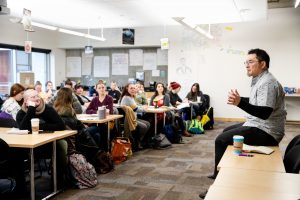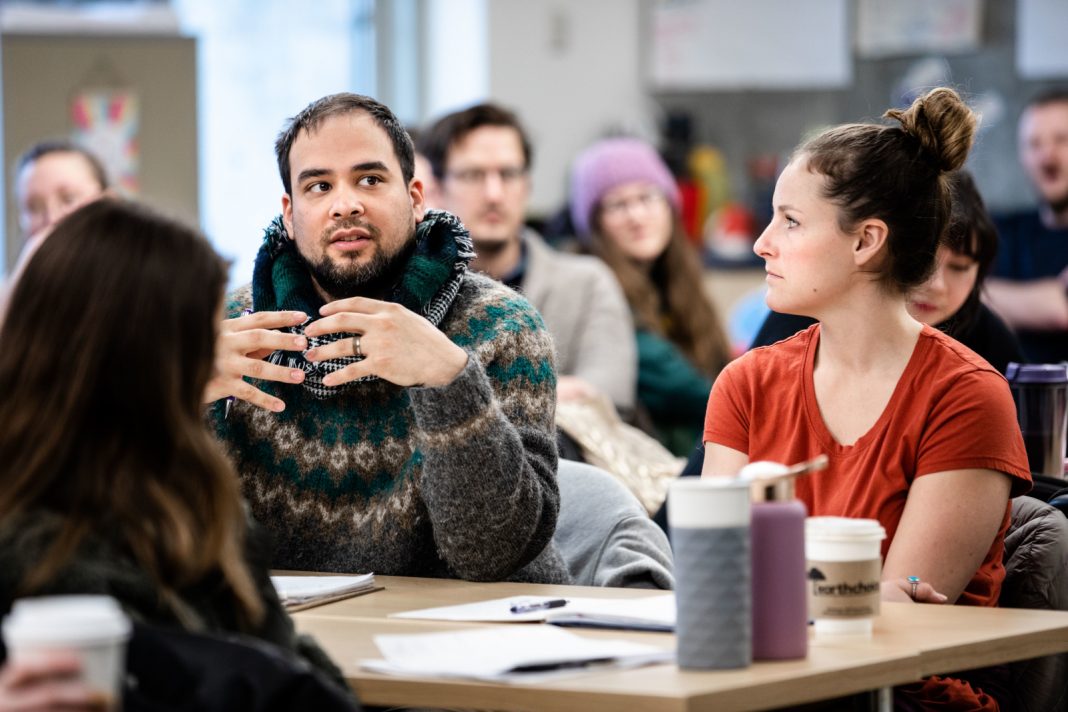Submitted by The Evergreen State College
As kids and teachers learn and work from home during the pandemic, both may have a renewed appreciation for the physical gathering space a classroom provides. Though distance-learning technology makes digital classrooms possible, it also blurs the line between life and school. According to Sue Feldman, director of The Evergreen State College’s newly-redesigned Master in Teaching (MiT) program, teachers and schools have an opportunity to learn from this moment and to build a stronger community that supports students after the bell has rung (or after the window has closed).

Feldman says this work can involve teachers who see richness in the diversity of the school community and know how to find and share community resources. “There should be a clear connection between students’ lives inside and outside school,” says Feldman. “Schools are a community asset. The more we can invite the community into schools, the better the schools are.” Evergreen’s redesigned MiT program aims to do just this.
Bringing the Neighborhood Back Together
In addition to structural changes such as reducing time spent in the program from two years to just one, an emphasis on community building is central to every aspect. Whereas typical teacher education programs place one student-teacher with one experienced teacher for one term, Evergreen’s new placement model aims to connect groups of student-teachers with a school community.

“We’re moving toward having a long-term partnership with local schools so that our students come as an asset to them,” says Feldman. “The school becomes a mentor site, where every teacher, para educator, administrator, student and parent in the school has something to contribute to an aspiring teacher’s practice.”
Crowdsourcing knowledge across a school community in this way can be a lifesaver for new teachers who have so much to learn in such a short period of time. Wayne Au, an Evergreen MiT graduate and award-winning professor at University of Washington Bothell’s School of Educational Studies, says, “In addition to understanding subject matter, teachers need a disposition of critical self-reflection and growth, knowing and caring for their students and communities and a commitment to reaching as many kids as is humanly possible.” For those who have chosen teaching as their path, the gravity of Au’s words is not lost. Evergreen’s MiT program is poised to prepare aspiring teachers as best as possible with a network of support.
Textbook Evergreen

Students of the redesigned MiT program will work closely with both fellow student-teachers and Evergreen’s expert faculty. A cutting-edge curriculum addressing equity in the education system (something that has long been a part of the program) remains central, as does an emphasis on showing aspiring teachers how to create curriculum relevant to all the students in their classrooms.
As usual at Evergreen, the MiT program assesses student-teachers using a system of narrative evaluations from faculty instead of grades. This way, aspiring teachers can more easily see where they’ve improved over time and where they may need to focus their efforts to better support their own students. This feedback joins that from teachers in the placement school to help MiT students improve quickly and to minimize their chances of developing harmful teaching habits.
The program has a long track record of successful graduates and a job placement rate of 100% over the past few years. The changes to the program aim to streamline the experience and better prepare teachers while graduating them faster and with less debt.
While nobody knows for certain what education will look like after the dust of COVID-19 has settled for good, Au says, “I think teachers are going to come out of this much more valued than they have been in the past.” He adds, “If I’m being an optimist, this experience has expanded our horizons about what is possible.” Feldman agrees, saying, “We have an opportunity to think with schools about what new teachers need to know.”
“We are learning all the time,” says Au. “The important thing is what we are learning.”
Applications for Evergreen’s MiT program are open now through November 1. The first cohort of the redesigned program will begin classes in spring and summer quarters 2021.



















































